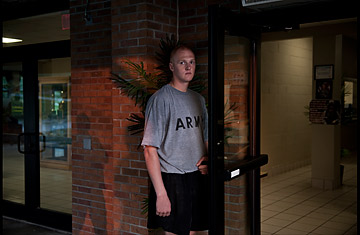
A recruit at Fort Jackson holds open the door to the mess hall during breakfast hours.
(7 of 8)
And in the press? Experience there is virtually unheard of, even after a decade of war. That ticks off military families--and serves to deepen their isolation from the culture. Ann Burger, whose Army-officer husband Joseph is on his second Afghan tour, relies on his e-mails for news of what's happening in Kabul. The Taliban "blew up a bus last week and killed 17 people, and I didn't know anything about it because it wasn't on the news," she says from her home outside Fort Lewis, Wash. She blames the media for moving on and notes that military families still hunger for battlefield coverage. "It makes me think that nobody cares," she says. "They're putting on things like the Kardashians getting divorced--it's on the news constantly--but we have soldiers over there dying, and you don't hear about it."
All these examples get to the heart of the matter: the real danger is that a military's strength ebbs the further away it gets from the society that sponsors and nurtures it. As fewer of its leaders have military experience, the U.S. is taking a very real risk that the people ordering the military around have less and less idea about how to use it wisely. Navy Captain Don Inbody was at 5th Fleet headquarters in Bahrain in January 2002, when he says the staff there got a look at the plans to invade Iraq. "There was a whole bunch of senior officers in the room, and we kind of looked at it, and my distinct recollection is a uniform sucking in of air." Inbody, now a political science professor at Texas State University, says there was no postwar planning evident. "We were thinking, If you want us to beat the Iraqi army, we can do that with one hand tied behind our back. But there was nothing after that," he remembers. "It signaled to me that U.S. political elites didn't view the military so much as part of the greater American society as their own private army."
Under the Constitution, only Congress can declare war. But the U.S. has put troops in harm's way hundreds of times since 1941, the last time Congress approved such a resolution. And the rest of us--so long as our kin aren't imperiled--have gone along. "There is a sense that popular influence over how the military gets used has waned significantly," says Andrew Bacevich, a retired Army colonel now teaching history at Boston University (and who lost his only son, Andrew Bacevich Jr., in 2007 in Iraq). "In a sense, the military has become Washington's military and not the nation's military ... If Americans felt a greater sense of ownership for the military," he adds, "then maybe Washington wouldn't get away with starting unnecessary wars and then waging them incompetently."
